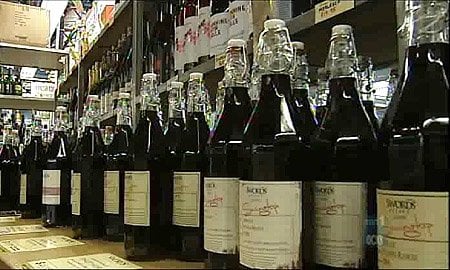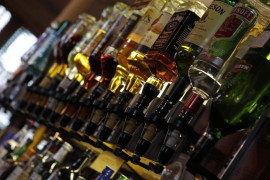
KARACHI: The Sindh High Court (SHC) allowed on Wednesday more time to the provincial government to explain whether or not the licences to wine shops were issued under the relevant rules and regulations.
A two-judge bench, headed by SHC Chief Justice Sajjad Ali Shah, was hearing the matter relating to the alleged sale of liquor in localities with higher Muslim populations than other minorities.
Earlier, the bench's order for an immediate ban on the sale of liquor across the province was set aside by the Supreme Court (SC) and wine shops were reopened.
The apex court's three-member bench, headed by then SC judge, Chief Justice of Pakistan Saqib Nisar, had referred the matter back to the SHC for swift adjudication after giving an opportunity of hearing to all parties.
During Wednesday's proceedings, the lawyers representing the owners of the wine shops contended that the consumption of liquor was not prohibited in Christianity or Hinduism.
They argued that in the light of the provisions of the Hadood Ordinance, 1979, Muslims could neither produce, sell nor consume liquor. However, the law did not prohibit its production and sale to religious minorities, they added.
But the petitioner, Ramesh Kumar Vankvani, insisted that consumption of liquor was prohibited in both Christianity and Hinduism and alleged that liquor was being sold in the name of non-Muslims in order to defame them.
Vankvani claimed that around 10 million Muslims consume liquor in Pakistan. Muslims may drink liquor if they wish but should not defame Hindus, he added.
Citing an example of this, the petitioner pointed out that a wine shop was being run adjacent to a mosque in Clifton's Block-5.
The judges inquired from the top provincial law officer, advocate-general Barrister Zamir Ghumro, as to under which law the licences to operate wine shops were issued by the provincial excise and taxation department. They further inquired whether the government had carried out the exercise to determine the ratio of Muslims and non-Muslims in the areas where liquor was being sold.
The judges observed that liquor was being sold in the name of religious minorities but apparently the sales surpassed the number of the non-Muslims' population.
CJ Shah reminded the law officer that such licences cannot be issued in violation of the relevant provisions of the Hadd Ordinance, 1979. Ghumro requested time to file comments on behalf of the provincial government. Allowing the request, the bench directed him to file the comments by January 23.
Published in The Express Tribune, January 12th, 2017.





























































COMMENTS
Comments are moderated and generally will be posted if they are on-topic and not abusive.
For more information, please see our Comments FAQ